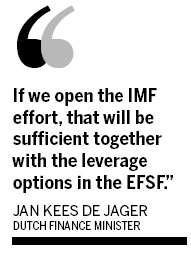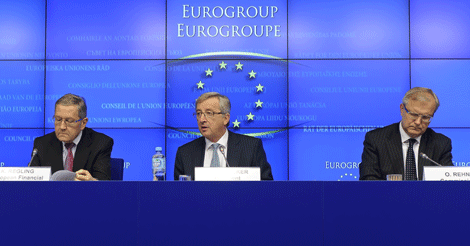Eurozone ministers agree to boost EFSF financing
Updated: 2011-12-01 07:40
(China Daily)
|
|||||||||
|
|
Bailout fund to 'cooperate more closely' with IMF to fight crisis
BRUSSELS - Eurozone finance ministers approved enhancements to their bailout fund while backing off from a target for its firepower and seeking a greater role for the International Monetary Fund (IMF) in fighting the debt crisis.
The finance chiefs of the 17 nations using the euro agreed to work on boosting the resources of the IMF so it can "cooperate more closely" with the European Financial Stability Facility (EFSF), Eurogroup President and Luxembourg's Prime Minister Jean-Claude Juncker told reporters on Tuesday in Brussels after leading the meeting.
"It's very important that the IMF globally will increase its resources either by raising its capital or by bilateral loans so that it can lend more money to eurozone countries in need," Dutch Finance Minister Jan Kees de Jager said. "If we open the IMF effort, that will be sufficient together with the leverage options in the EFSF."
After a series of stop-gap accords failed to protect Italy and Spain from surging bond yields, the eurozone ministers are under growing pressure from US leaders and international financial markets to find ways to boost the EFSF's effectiveness. They agreed on a plan to guarantee up to 30 percent of new bond issues from troubled governments and to develop investment vehicles that would boost the facility's ability to intervene in primary and secondary bond markets.
Total firepower

EFSF Chief Executive Officer Klaus Regling said it is "impossible to give one number" for the total firepower of the fund, backing off an earlier goal of 1 trillion euros ($1.3 trillion). "Market conditions change over time," he said.
Juncker said the EFSF's capacity will be "very substantial" and will be supplemented by the IMF. The ministers "agreed to rapidly explore an increase of the resources of the IMF through bilateral loans," Juncker said, "so that the IMF could adequately match the new firepower of the EFSF and cooperate more closely with it."
European Union Economic and Monetary Affairs Commissioner Olli Rehn said the issue "needs to be discussed with the IMF, and this work is in progress". Neither Rehn nor Juncker named who might provide the loans. "We are together with the IMF consulting contributors through bilateral loans," Rehn said.
The Europeans are "not there yet" in terms of fleshing out their plan enough for emerging-market nations to pledge funds to the IMF that would then aid the eurozone, said Callum Henderson, global head of foreign-exchange research at Standard Chartered PLC. "It does appear that we are making progress - the question is are we making progress fast enough."
The EFSF bond guarantees and investment vehicles can run simultaneously and could be functioning by early next year, according to a document released by the fund. "Many investors are interested and will participate if we have a solidly commercial product," Regling said. "But don't expect massive inflows immediately. The needs will come over time."
Short-term bills
"These decisions have clearly enhanced the capacity and flexibility of the EFSF," said Charles Dallara, head of the Institute of International Finance, which represents more than 450 financial companies. "The EFSF can now issue short-term bills and use government bonds it may purchase on secondary markets for repo transactions."
Greater roles for both the European Central Bank (ECB) and the IMF are "on the table", Belgian Finance Minister Didier Reynders said as he left Tuesday's meeting.
"The EFSF alone will not be able to solve all the problems," Luxembourg's Finance Minister Luc Frieden said. "We have to do so together with the IMF and with the ECB in the framework of its independence."
Bloomberg News












